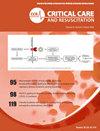缓冲盐溶液与0.9%氯化钠作为液体治疗中重度糖尿病酮症酸中毒患者:一项3期聚类交叉、盲法、随机对照试验的研究方案
IF 1.4
4区 医学
Q3 CRITICAL CARE MEDICINE
引用次数: 0
摘要
背景:对于糖尿病酮症酸中毒(DKA)患者,液体治疗的最佳选择尚不确定,尽管初步数据表明缓冲晶体溶液(血浆- lyte®148)可能比0.9%生理盐水有一些优势。目的介绍“平衡电解质溶液与生理盐水治疗糖尿病酮症酸中毒试验”(BEST-DKA)的研究方案。best -DKA是一项3期聚类交叉、盲法、实用、随机对照试验,比较生理盐水或缓冲晶体溶液对澳大利亚20家医院急诊科和/或重症监护室治疗的中度至重度DKA患者的影响。每家医院将被随机分配在12个月内使用生理盐水或缓冲晶体溶液,然后在接下来的12个月内使用替代液体。盲法研究液体将用于纳入患者的所有复苏和维持目的。主要结局指标:本分组随机、交叉随机对照试验(RCT)的设计目标是招募至少400名患者,这将提供91.4%的能力来检测主要结局(存活天数和出院天数至第28天)的2天增加,并选择消费者代表。次要结局包括第28天的生活质量和疲劳评分、重症监护病房和住院时间、急性肾损伤和缓解DKA的时间。所有分析将在意向治疗的基础上进行。在中期分析之前,将制定预先规定的统计分析计划。BEST-DKA试验于2024年3月开始招募,结果将确定与生理盐水相比,血浆- lyte®148治疗是否会增加中度或重度DKA患者的存活天数和出院天数。本文章由计算机程序翻译,如有差异,请以英文原文为准。
Buffered salt solution versus 0.9% sodium chloride as fluid therapy for patients presenting with moderate to severe diabetic ketoacidosis: Study protocol for a Phase-3 cluster-crossover, blinded, randomised, controlled trial
Background
The optimal choice of fluid therapy for patients with diabetic ketoacidosis (DKA) is uncertain, though preliminary data suggest that buffered crystalloid solutions (Plasma-Lyte® 148) may offer some advantages over 0.9% saline.
Objective
To describe the study protocol for the ‘Balanced Electrolyte Solution versus Saline Trial for Diabetic Ketoacidosis’ (BEST-DKA) trial.
Design, setting and participants
BEST-DKA is a Phase 3 cluster-crossover, blinded, pragmatic, randomised, controlled trial comparing the effects of saline or buffered crystalloid solution in patients with moderate to severe DKA treated in the emergency department and/or intensive care unit at twenty hospitals in Australia. Each hospital will be randomised to use either saline or buffered crystalloid solution for a period of 12 months before crossing over to the alternate fluid for the next 12 months. The blinded study fluid will be used for all resuscitation and maintenance purposes for included patients.
Main outcome measures
This cluster-randomised, crossover randomised controlled trial (RCT) has been designed with the aim of enrolling a minimum of 400 patients, which will provide >91.4% power to detect a 2-day increase in the primary outcome, days alive and out of hospital to day 28, chosen with consumer representation. Secondary outcomes include quality of life and fatigue scores at day 28, intensive care unit and hospital lengths of stay, acute kidney injury, and time to resolution of DKA. All analyses will be conducted on an intention-to-treat basis. A prespecified statistical analysis plan will be developed prior to interim analysis.
Results and conclusion
The BEST-DKA trial commenced enrolment in March 2024 and should generate results that will determine whether treatment with Plasma-Lyte® 148, compared with saline, results in increased days alive, and out of hospital to day 28 for patients with moderate or severe DKA.
求助全文
通过发布文献求助,成功后即可免费获取论文全文。
去求助
来源期刊

Critical Care and Resuscitation
CRITICAL CARE MEDICINE-
CiteScore
7.70
自引率
3.40%
发文量
44
审稿时长
>12 weeks
期刊介绍:
ritical Care and Resuscitation (CC&R) is the official scientific journal of the College of Intensive Care Medicine (CICM). The Journal is a quarterly publication (ISSN 1441-2772) with original articles of scientific and clinical interest in the specialities of Critical Care, Intensive Care, Anaesthesia, Emergency Medicine and related disciplines.
The Journal is received by all Fellows and trainees, along with an increasing number of subscribers from around the world.
The CC&R Journal currently has an impact factor of 3.3, placing it in 8th position in world critical care journals and in first position in the world outside the USA and Europe.
 求助内容:
求助内容: 应助结果提醒方式:
应助结果提醒方式:


